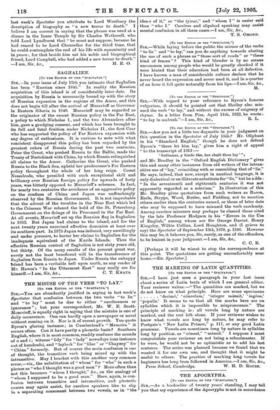Six,—You are abundantly justified in saying in last week's Spectator
that confusion between the two verbs " to lie " and " to lay " must be due to either " carelessness or ignorance " ; but your correspondent, Mr. W. E. Scott- Moncrieff, is equally right in saying that the mistake is one of daily occurrence. One can hardly open a newspaper or novel without coming on it. Nor is it of recent growth. You quote Byron's glaring instance ; in Cumberland's " Memoirs " it recurs often. Can it have partly a phonetic basis P Southern English, where it is most common, readily confuses the sounds of a and i; witness " lidy" for " lady" nowadays (one instance out of hundreds), and " laylock " for "lilac" or " Chayney" for " China " formerly. But of course the main confusion is one of thought, the transitive verb being mixed up with the intransitive. May I bracket with this another very common error,—viz., the substitution of " whom" for " who" in such a phrase as "who I thought was a good man" ? More often than not this becomes "whom I thought," &c., on the analogy of " whom I supposed to be a good man." Here, again, is con- fusion between transitive and intransitive, and phonetic causes may again assist, for careless speakers like to slip in a separating consonant between two vowels, as in " the
T. S. OMOND.
MO TEE EDITOR OF THE " SPECTATOR.."]


































 Previous page
Previous page